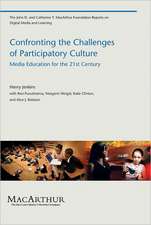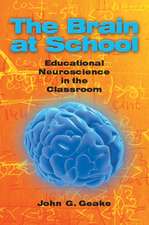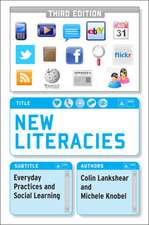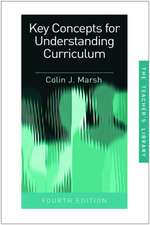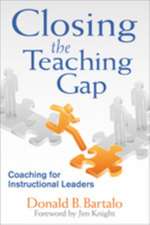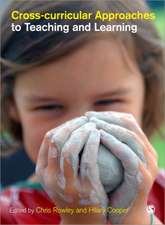East-Asian Primary Science Curricula: An Overview Using Revised Bloom's Taxonomy: SpringerBriefs in Education
Autor Yew-Jin Lee, Mijung Kim, Qingna Jin, Hye-Gyoung Yoon, Kenji Matsubaraen Limba Engleză Paperback – 30 sep 2016
Din seria SpringerBriefs in Education
-
 Preț: 317.28 lei
Preț: 317.28 lei -
 Preț: 478.71 lei
Preț: 478.71 lei - 20%
 Preț: 387.43 lei
Preț: 387.43 lei - 17%
 Preț: 392.10 lei
Preț: 392.10 lei -
 Preț: 196.30 lei
Preț: 196.30 lei -
 Preț: 394.40 lei
Preț: 394.40 lei -
 Preț: 356.31 lei
Preț: 356.31 lei -
 Preț: 444.52 lei
Preț: 444.52 lei -
 Preț: 196.15 lei
Preț: 196.15 lei -
 Preț: 262.86 lei
Preț: 262.86 lei -
 Preț: 370.60 lei
Preț: 370.60 lei -
 Preț: 379.68 lei
Preț: 379.68 lei -
 Preț: 408.44 lei
Preț: 408.44 lei -
 Preț: 376.22 lei
Preț: 376.22 lei -
 Preț: 378.34 lei
Preț: 378.34 lei -
 Preț: 346.59 lei
Preț: 346.59 lei -
 Preț: 377.18 lei
Preț: 377.18 lei -
 Preț: 377.35 lei
Preț: 377.35 lei -
 Preț: 476.03 lei
Preț: 476.03 lei -
 Preț: 376.43 lei
Preț: 376.43 lei -
 Preț: 379.48 lei
Preț: 379.48 lei -
 Preț: 479.29 lei
Preț: 479.29 lei -
 Preț: 340.61 lei
Preț: 340.61 lei -
 Preț: 377.18 lei
Preț: 377.18 lei -
 Preț: 377.57 lei
Preț: 377.57 lei -
 Preț: 376.59 lei
Preț: 376.59 lei -
 Preț: 377.18 lei
Preț: 377.18 lei -
 Preț: 380.84 lei
Preț: 380.84 lei -
 Preț: 379.09 lei
Preț: 379.09 lei -
 Preț: 354.09 lei
Preț: 354.09 lei -
 Preț: 377.95 lei
Preț: 377.95 lei -
 Preț: 379.68 lei
Preț: 379.68 lei -
 Preț: 377.35 lei
Preț: 377.35 lei -
 Preț: 346.59 lei
Preț: 346.59 lei -
 Preț: 444.52 lei
Preț: 444.52 lei -
 Preț: 376.22 lei
Preț: 376.22 lei -
 Preț: 381.21 lei
Preț: 381.21 lei -
 Preț: 348.13 lei
Preț: 348.13 lei -
 Preț: 409.25 lei
Preț: 409.25 lei -
 Preț: 410.17 lei
Preț: 410.17 lei -
 Preț: 377.57 lei
Preț: 377.57 lei -
 Preț: 380.63 lei
Preț: 380.63 lei -
 Preț: 376.59 lei
Preț: 376.59 lei -
 Preț: 377.57 lei
Preț: 377.57 lei -
 Preț: 380.07 lei
Preț: 380.07 lei -
 Preț: 378.54 lei
Preț: 378.54 lei -
 Preț: 379.48 lei
Preț: 379.48 lei -
 Preț: 377.73 lei
Preț: 377.73 lei -
 Preț: 342.74 lei
Preț: 342.74 lei
Preț: 376.59 lei
Nou
Puncte Express: 565
Preț estimativ în valută:
72.06€ • 75.24$ • 59.64£
72.06€ • 75.24$ • 59.64£
Carte disponibilă
Livrare economică 15-29 martie
Preluare comenzi: 021 569.72.76
Specificații
ISBN-13: 9789811026898
ISBN-10: 9811026890
Pagini: 107
Ilustrații: XIII, 81 p. 2 illus.
Dimensiuni: 155 x 235 x 5 mm
Greutate: 0.15 kg
Ediția:1st ed. 2017
Editura: Springer Nature Singapore
Colecția Springer
Seria SpringerBriefs in Education
Locul publicării:Singapore, Singapore
ISBN-10: 9811026890
Pagini: 107
Ilustrații: XIII, 81 p. 2 illus.
Dimensiuni: 155 x 235 x 5 mm
Greutate: 0.15 kg
Ediția:1st ed. 2017
Editura: Springer Nature Singapore
Colecția Springer
Seria SpringerBriefs in Education
Locul publicării:Singapore, Singapore
Cuprins
Chapter 1 Primary Science Curricula: Past and Present Realities.- Chapter 2 Revised Bloom's Taxonomy: The Swiss Army Knife in Curriculum Research.- Chapter 3 Curricula, Coders, and Coding.- Chapter 4 The Intellectual Demands of East-Asian Primary Science Curricula.- Chapter 5 The Shape of Intellectual Demands in East-Asia Primary Science Curricula.
Notă biografică
Dr. Lee Yew Jin trained as a secondary school biology teacher in Singapore. Currently, his interests are in primary science, curriculum studies, science as a way of knowing, and informal learning environments. He also brings sociocultural concepts of learning as well as theoretical insights from the social sciences and humanities. His recent research (with his graduate students) includes assessing knowledge in classrooms, inquiry science, and engineering, design & technology.
Dr. Mijung Kim is an associate professor at the Faculty of Education, University of Alberta, Canada. Her research interests are science literacy, inquiry-based teaching, scientific reasoning and problem solving, dialogical argumentation and teacher education. She also brings complex issues of STSE (Science-Technology-Society-Enviornment) relationships into her research and teaching to explore decision-making and action for sustainability.
Qingna Jin is a Ph.D. student at theFaculty of Education, University of Alberta, Canada. She graduated with a Masters degree in Education from the School of Education, Beijing Normal University, Beijing, China. Her research interests include scientific problem-solving, and inquiry-based teaching and learning, with a particular focus on the development of students’ metacognition in science learning.
Dr. Hye-Gyoung Yoon is a professor at Chuncheon National University of Education, South Korea. Her research interests are science teacher education, teachers’ pedagogical reasoning and inquiry-based science teaching. She is interested in how teachers can learn from their own practice within a collaborative community.
Dr. Kenji Matsubara is a senior researcher at the Department of Curriculum Research, Curriculum Research Center, National Institute for Educational Policy Research (NIER), Japan. His research interests include science curriculum development, international comparisons of science education, lesson study and lesson analysis.
Dr. Mijung Kim is an associate professor at the Faculty of Education, University of Alberta, Canada. Her research interests are science literacy, inquiry-based teaching, scientific reasoning and problem solving, dialogical argumentation and teacher education. She also brings complex issues of STSE (Science-Technology-Society-Enviornment) relationships into her research and teaching to explore decision-making and action for sustainability.
Qingna Jin is a Ph.D. student at theFaculty of Education, University of Alberta, Canada. She graduated with a Masters degree in Education from the School of Education, Beijing Normal University, Beijing, China. Her research interests include scientific problem-solving, and inquiry-based teaching and learning, with a particular focus on the development of students’ metacognition in science learning.
Dr. Hye-Gyoung Yoon is a professor at Chuncheon National University of Education, South Korea. Her research interests are science teacher education, teachers’ pedagogical reasoning and inquiry-based science teaching. She is interested in how teachers can learn from their own practice within a collaborative community.
Dr. Kenji Matsubara is a senior researcher at the Department of Curriculum Research, Curriculum Research Center, National Institute for Educational Policy Research (NIER), Japan. His research interests include science curriculum development, international comparisons of science education, lesson study and lesson analysis.
Caracteristici
Offers international audiences insights into why and how East Asian states have succeeded so well in teaching young people about science from the perspective of curriculum making Includes new findings with theoretical and practical significance for audiences interested in primary science education Useful for governments, those involved in PISA/TIMMS work as well as for comparative and science education researchers Includes supplementary material: sn.pub/extras

